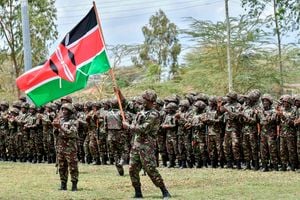Air strikes on Shabaab bases not retaliation
What you need to know:
- KDF spokesman says the two bases had long been identified for attack.
- He also denied reports that civilians and livestock were killed during the attack.
Air strikes on Al-Shabaab bases in Somalia on Sunday were not in retaliation to the killings at the Garissa University College, Kenya Defence Forces spokesman David Obonyo has said.
Col Obonyo on Tuesday said the two bases had long been identified for attack.
He also denied reports that civilians and livestock were killed during the attack.
Kenyan troops used helicopter gunships to destroy the operational bases which Al-Shabaab fighters use to organise themselves before sneaking into Kenya.
“The Garissa attack was just a coincidence because the bases had been identified earlier. And it is not also true civilians were killed in the bombing. Our actions are usually based on credible intelligence which also must go through verification,” said Colonel Obonyo.
WORST ATTACK
In Garissa, 142 students were killed in the worst terrorist attack since the 1998 bombing of United States embassy in Nairobi.
The two bases are in Gugodhowe and Sheikh Ismail in Gedo. Currently, no African Union Mission troops have been deployed in the region, giving the terrorists a lot of territory.
Amisom rules have restricted KDF troops in Somalia to Sector 2. However, Kenya had to send helicopter gunships to fill the void to safeguard her boundaries.
“We were forced to take action due the lack of deployment, especially because terrorists arrested in Somalia had used those bases. We have to take care of our security,” Col Obonyo said.





